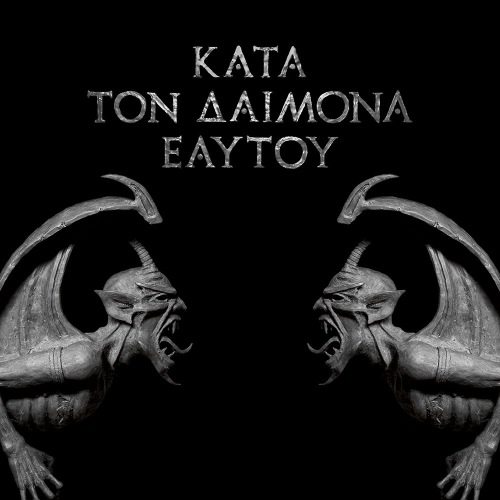Darkness looms over the Ancient Near East - 91%
In my listening to this band, this has to be one of my favorites of theirs. Rotting Christ (RC) really goes into significant detail with their pagan themed lyrics on this one. Theogonia had the "Enuma Elish" on it but Kata Ton Daimona Eautou (Anglicized) explores Zorastrianism, Babylonian mythology, and even the Christian apocalypse (from their dark, pagan perspective, though). Here, they even incorporate Mayan religious themes into their lyrical exploration right at the start. This album opens up their lyrical exploration in their folk metal themes farther than their two previously studio recorded albums.
Sakis Tolis is a guitar deity as he has shown before. He nails the tremolo picking which is necessary in black metal. He nails the solo on their distorted version of the Pater Noster, "Grandis Spiritus Diavolos" (which is given a twisted, Satanic spin to it). His riffs throughout are deep and dark. The intro to "In Yumen-Xibalba" is dark and has elements seemingly inspired by a doom metal riff. It drones and bellows making darker his own repetitive, ominous vocal pronunciations. The djent riffs return with ferocity on "Gilgames" and are combined with a barrage of hyper-static power-chord riffs and tremolo picking. "χξϛ" carries a strong, droning riff throughout as the beast emerges from the sea and "Ahura Mazdā-Aŋra Mainiuu" is made even more sinister by a dark, power-chord riff that rages in the background. Sakis is clearly a gifted guitar master.
As usual, the folk implementations continue in a track of improvement for RC. The piano introduction to the track "Cine iubeşte şi lasă" raises a feeling that doom is lingering as it breaks out into a dark melody. The intro on "P'unchaw kachun - Tuta kachun" seems a throwback to that temple experience from Theogonia and the atmosphere provided in "Gilgames" gives a feeling that royalty is being crowned on top of an ancient Ziggurat. The echoing, hollering sound at the beginning of "Ahura Mazdā-Aŋra Mainiuu" sounds like a war-cry or the beginning of a religious dance. Although more usage of classical instruments are used here, such as horns and bagpipes, they remain more-so in the background. RC does an excellent job at implementing a folk style with a limited use of folk instruments.
Themis Tolis is always the highlight of the album. It's his slow, yet pounding, pace which starts off the album and guides the rest of it. He goes into his vicious, blast-beat style drumming throughout keeping the pace at a rush. He slows down to lower the speed of the music yet again. A pause occurs momentarily in the opening track. His drumming is the only thing you hear for a brief second or two until he starts up the rush again. Yet again, he is the bridle of the two brothers constantly leading the race horse that is named Sakis.
As usual, and I know I've mercilessly ripped on Sakis's vocal abilities before, RC would do better to find a better vocalist. While his screeching has clearly shown dramatic improvement, it is increasingly echoing throughout the entire album as if he singing everything multiple times over in the same sentence. It sounds as if he is gurgling water and is about to spit mouthwash into the sink. It's a shame because Sakis clearly has a gifted ability and I would probably give their albums an even higher rating if he could nail down the vocals.
Overall, RC has put together another stunning contribution to the folk metal scene. With the added instrumentals, the blast-beat drumming, and the rip-roaring guitar riffs, you could just pretend that Sakis isn't singing. Or at least you can imagine that they are all instrumentals and tone out his god-awful vocals abilities. Musically and lyrically, it is a masterpiece--just please, someone silence Sakis's singing already!

